- Home
- Anne Hampson
Man Without Honour
Man Without Honour Read online
Man Without Honour
By
Anne Hampson
Contents
Chapter One
Chapter Two
Chapter Three
Chapter Four
Chapter Five
Chapter Six
Chapter Seven
Chapter Eight
Chapter Nine
Chapter Ten
'You Can Cut Out the Pretence, Leon!'
She cast him a scornful glance. 'It must have been a strain to pretend you loved me!'
'Just what is this?' he demanded, and the arrogant tone only added fuel to her anger.
'I happened to overhear a conversation between your mother and sister. Now I know why you married me.' She broke off and laughed hysterically, out of control. 'You gave up the woman you loved and married me—all for this ring! You had no love for me!'
ANNE HAMPSON currently makes her home in England, but this top romance author has travelled and lived all over the world. This variety of experience is reflected in her books, which present the ever-changing face of romance as it is found wherever people fall in love.
Dear Reader:
Silhouette Romances is an exciting new publishing venture. We will be presenting the very finest writers of contemporary romantic fiction as well as outstanding new talent in this field. It is our hope that our stories, our heroes and our heroines will give you, the reader, all you want from romantic fiction.
Also, you play an important part in our future plans for Silhouette Romances. We welcome any suggestions or comments on our books and I invite you to write to us at the address below.
So, enjoy this book and all the wonderful romances from Silhouette. They're for you!
Karen Solem
Editor-in-Chief
Silhouette Books
P.O. Box 769
New York, N.Y. 10019
Copyright © 1982 by Filestore Limited and Silhouette Books,
a Simon & Schuster Division of Gulf & Western Corporation
ISBN: 0-671-57136-2
First Silhouette Books printing March, 1982
Map by Tony Ferrara
Other Silhouette Books
by
Anne Hampson
Payment in Full
Stormy Masquerade
Second Tomorrow
The Dawn Steals Softly
Man of the Outback
Where Eagles Nest
Man Without a Heart
Shadow of Apollo
Enchantment
Fascination
Desire
Realm of the Pagans
Chapter One
The garden had looked forlorn all winter. It appeared even worse when the first glimmerings of spring brought to light the few snowdrops and crocuses struggling to raise their heads above the dank tangle of weeds and long shoots of brambles which seemed intent on strangling anything that had the temerity to force its way into a world waiting eagerly for its appearance.
Kathryn Dalton stared out the window of her first-floor flat in the large country mansion and, as it was Saturday, decided to lend her aid to the valiant little flowers down there. After wrapping herself up in a coat and scarf, she found the gardening fork she used for her window boxes and went down the wide, balustraded staircase into the lofty hall of the beautiful house which had been converted into flats some years ago.
Each tenant was required to contribute towards the upkeep of the gardens, but the man employed by the owner of the flats seemed to come only when the urge took him, which was not very often even during the summer months, and as the owner rarely visited the flats, this so-called gardener managed to get away with his neglect.
Each tenant would put in a few hours now and then, just to keep the gardens tidy, and Kathryn had done her share ever since she had taken possession of the flat on the death of her mother four years earlier, when Kathryn was only eighteen years of age. Her father had died several years previously, and as he had been an invalid for three years before that, he left his wife and daughter in pretty poor circumstances. Mrs. Dalton had managed to send Kathryn to a secretarial school, with the result that she now had an excellent post with a firm of wholesale clothiers.
'Hello, Kathryn. Surely you're not going out there already!' The cheery voice brought Kathryn round just as she was about to open the door. She grinned and glanced down at the fork in her hand.
'I must, Carole. The poor snowdrops and crocuses are being choked by the weeds that were left last year.'
'You make me feel guilty. Maybe I'll come out and give you a hand when I've done my washing.' Carole, like Kathryn, worked all week and did her chores on the week-end. She was on her own, though she had parents and several brothers and sisters. She had become fed up with the crowded house and had left home two years ago, and had been fortunate enough to get a charming ground-floor flat in what was one of the most desirable blocks in the area.
'You've no need to feel guilty.' Kathryn laughed, tossing the end of her scarf over her shoulder and bringing out a silken mass of russet-brown hair from beneath it. 'I just had an urge to see those spring flowers; they'll be a tonic after the horrible winter we've been through.'
'And it has been horrible.' Carole shuddered. 'I'd begun to feel I'd scream if that snow and hail and frost didn't come to an end soon!'
'Same here,' responded Kathryn grimly.
'The sun's coming through this morning, though, so I think I will join you in…' She glanced at her watch. 'In about half an hour. I'll just put my bedding and my smalls in the machine and then I'll be out.'
Kathryn was struggling with some obstinate brambles when Carole joined her less than half an hour later.
'Phew—It's harder work than I anticipated,' she exclaimed. 'But at least it keeps you warm. I feel all aglow!'
'You look it,' returned Carole with undisguised admiration in her voice. 'The picture of youthful health!'
'Thanks,' laughed Kathryn, her grey-green eyes dancing as she threw Carole a glance. 'But as a matter of fact, I feel about eighty! My back's killing me!'
It was Carole's turn to laugh. 'No wonder; you're going at it as if you've an overseer with a whip standing at your back. Take it easy, there's no urgency. The "little ladies white and green" won't mind waiting a while longer.'
Carole had a larger fork, and she began working on another bed altogether, going deep into the soil to uproot some dandelions that had had it all their own way since September of the previous year.
A sudden exclamation from Kathryn made her turn and cast her friend an interrogating glance. 'What is it?'
'I've found a buried treasure. Diamonds and sapphires! Aren't you envious?' There was laughter in Kathryn's voice as she held out the dirt-begrimed ring for Carole to take from her. 'Woolworth's, obviously. And a child's, I should say,' she added with a laugh.
'Yes,' agreed Carole, scraping some of the soil from it. 'A child's, judging by the size of it.' She handed it back, and Kathryn spent the next few seconds removing more of the caked soil from the ring.
'It isn't a child's…' She had tried it on her little finger but found it slightly too large. 'It just fits my engagement finger,' she said, but took it off and was about to toss it away when something made her change her mind. 'It's ever so pretty,' she observed. 'Cleaned up, it could be a rather nice piece of costume jewellery.'
Carole shrugged her shoulders. She had been left some rather elegant pieces of jewellery by an aunt some years ago, and the superb quality of these had made her fall out altogether with the costume jewellery which other girls were in the habit of wearing.
'I'd not bother if I were you,' she advised. 'You've a couple of nice rings—that signet ring you wear, and your mother's engagement ring.'
Kathryn nodded, thinking that this ring, with its huge 'sapphire' surrounded by what could only be pieces of glass, was not really worth keeping. Again she was about to toss it away when something beyond her control made her put it in her coat pocket.
And as it was not a coat she wore regularly, the ring lay there forgotten until the following Saturday, when, glancing from her window to the plot where the snowdrops and crocuses were now flourishing in the sunshine, Kathryn remembered the ring. After having her breakfast, she brought it out and scrubbed it with her nail brush.
'It's nice, no matter what Carole says,' she murmured, wriggling her finger to allow the stones to catch the light. 'I don't think I want to throw it away.'
She naturally began to wonder about the ring, because now she was not sure it was as worthless as she and Carole had first concluded. For one thing, the setting was both exquisite and unusual.
Kathryn took it off her finger and dropped in into a little box where she kept buttons and the like, and promptly forgot it again until, three weeks later, she attended a week-end course at Branton Manor, another mansion about a quarter of a mile along the lovely tree-lined road in which she lived. There was another mansion farther along still, and one on the opposite side of the road. This one was occupied by an artist and his wife and was wholly a private residence, basking in the faded glory of its past. The one along from Branton Manor was flats, but its conversion had not been carried out with anything like the care and cost of the one in which Kathryn lived.
Branton Manor was now a college where one could attend seminars on varied and interesting subjects all the year round. Kathryn treated herself now and then, and this time she had been interested because the subject was local history. Most people stayed over in the accommodations provided, but those living within reasonable distance naturally went home each evening. The seminar began on Friday evening with a get-together in the hall over a cup of tea and a biscuit. After that the first lecture was given in what had—in its heyday—been the Blue Withdrawing-Room of Branton Manor.
Kathryn, sitting at the back, had a small pad before her on the desk, and as she listened, she made notes. This particular house had been owned by the Earl of Langley, while the one farther along had been built for his son and heir to bring his bride to on his marriage to a society beauty.
'Both mansions were spectacularly furnished,' the tutor went on. 'The owners were wealthy landowners but they came upon hard times and the inevitable result was that these houses eventually came on the market, but at a time when more like them were having to be abandoned in favour of smaller places. And so we have flats…' He spread his hands in a gesture of regret. 'And places like this, which most of you will know about if you're in the habit of attending these events regularly.'
Question time came, and Kathryn was ready with one or two queries about Thornbury Hall, where she herself lived.
'It was one of the many stately homes of the St. Clere family,' the tutor said. 'But they, like so many others, fell upon hard times, and one by one their ancestral homes had to be sold.'
'The St. Cleres,' murmured Kathryn almost to herself, and then, louder, so that all could hear her. 'They're a very old family, I think?'
The tutor, a middle-aged man whose whole life was steeped in history, nodded his head a little absently, as his attention was on the papers before him, which he was rapidly going through.
'They inherited the famous Penshurst around the mid-fifteenth century, having come into the property through an heiress, but lost it again when it was sold to the Duke of Bedford. The St. Cleres who lived in these parts were another branch, though, but equally as wealthy—in those days, that was.' He paused, having found what he was seeking for. 'As a matter of fact, I'm going to give one of tomorrow's lectures over entirely to the St. Cleres.' He looked at Kathryn and smiled. 'Have you some special reason for your interest?'
'Yes, I live in a flat at Thornbury Hall, just along the road here.'
A stir of interest followed this, and almost every head turned. Kathryn glanced down at her notebook, feeling embarrassed and wishing she had not mentioned living at Thornbury Hall.
However, the tutor knew it was now flats, and she heard him say, 'I believe the conversion there was tasteful—beautifully carried out by a man who was obviously not without money or ideas.'
'It is beautifully done,' agreed Kathryn, conscious now of a hint of envy on the faces turned towards her.
'I have a first-floor flat which looks across the grounds to the park and then to the hills.'
'Well, if you will bear with me this evening, I'll give you all the information you want tomorrow.'
Dinner in the large wainscoted dining-room followed the lecture, and afterwards the students from all the various seminars gathered in the lounge, where drinks could be bought. Large armchairs in blue upholstery were scattered about the massive room; small tables, stools, and settles were also there for the comfort and enjoyment of the students. Kathryn soon found herself drawn into a conversation with several other young people, women and men. The tutor, Professor James Marney, joined them, a tankard of beer in his hand. He asked Kathryn her name, seemed very interested in her, and soon told her more about the illustrious St. Clere family who, it was supposed, had come over from Normandy with William the Conqueror and fought with him at Hastings.
But it was the following morning before Kathryn heard the item of interest which sent her thoughts flying to the ring she had found in the garden at Thornbury Hall.
Dr. Marney had been reciting the history of the family, and his subject being local history, he naturally kept to the branch of the family which had eventually settled in Cheshire.
'There was an interesting story about some jewellery,' he said, glancing at his notes. 'Apparently there was a set of jewellery, a family heirloom—one of many, I suppose—consisting of a diamond-and-sapphire neck-lace, two bracelets, a tiara, earrings and other items. The craftsman who made this jewellery, a man called Sydney Abernon, was mad, so it was said. He had the "gift of curse," according to an old document which I once managed to peruse and which is now in the possession of another branch of the family.'
'The gift of curse?' someone repeated from the front row.
'Yes; he had the ability to put a curse on people.'
Laughter was heard, though subdued, from several of the younger students.
'Well… you may treat this with derision,' said the professor quietly, 'but this man, this superb craftsman who made jewellery for many European kings and queens, was feared greatly at that time, and it was believed that no one would be foolish enough to cross him.' Dr. Marney paused, flicking over a piece of paper in order to glance at the one beneath it. 'This man made a set of jewellery for one Sir Guy St. Clere, for the nobleman's wife, a woman with the reputation of being the greatest beauty of her day. When Sir Guy was told how much the jewellery was to cost him, he called the man a robber and refused to pay, offering him what, in his opinion, the jewellery was worth. Sydney Abernon had no alternative other than to accept, having already delivered the jewellery and had his request for its return arrogantly refused by Sir Guy. So he put a curse on the jewellery to the effect that if ever one piece became separated from the rest, the owner at the time would, along with his whole family, suffer the direst of misfortunes. The curse was to go on to all Sir Guy's descendants and to anyone else who came into possession of the jewellery, and would come off only when the set was again complete.'
'It's an interesting story,' said one young student with some amusement, 'but not one to be taken seriously, I think.'
'Certainly not,' from a lady sitting at the end of the second row. 'One hears all sorts of stories if one delves into ancient documents pertaining to some of these old families. I am of course thinking of Nixon's prophecies.'
'Well,' said the professor mildly, 'we have to admit that Nixon's prophecies mostly turned out to be true.'
'They did?' The woman seemed puzzled by this piece of information.
/>
'Many of them did, yes. One was of the way he himself would die. It came true, along with others concerning the family for whom he worked at Vale Royal Abbey in Cheshire.' No one had any comment to make, and the professor continued by saying that one of the pieces of jewellery had in fact been lost. 'I have never been able to find out what piece it was,' he went on, glancing down at his notes. 'It could have been any one of the pieces—a brooch perhaps, or a ring. It was said that it could have been stolen by one of the servants—one can never get the correct story when it happened so long ago. The interesting thing is that the curse seemed to be effective, as the whole family of this nobleman who owned the jewellery suffered in some way or another. The two young sons fought a duel to the death over nothing more important than a serving wench whom they both wanted. A daughter died of the plague less than a month later. The husband, mad with grief and blaming his wife for losing the piece of jewellery, made her enter a nunnery and he himself died soon afterwards, leaving a daughter, a child of five, to inherit all his houses and lands.'
'And the jewellery,' said someone from the middle of the room.
Another stir of interest had followed as the professor's narrative came to an end. Kathryn, her heart beating faster than normal, had several times opened her mouth to speak, to tell the professor about the ring she had found, but she had no opportunity of interrupting him. And now, when she did have the chance to speak, she was held back by some force quite beyond her control. A murmuring had begun, with people softly making derisive and sceptical remarks about the absurdity of curses. Someone asked the professor if he believed in this particular one. His reply was that he had an open mind, for while logic rejected the idea of one person being able to curse another, in this particular case the curse did seem to have been effective.

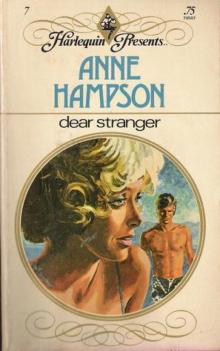 Dear Stranger
Dear Stranger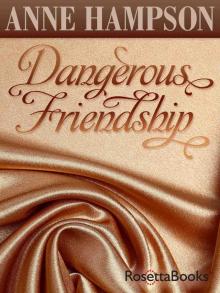 Dangerous Friendship
Dangerous Friendship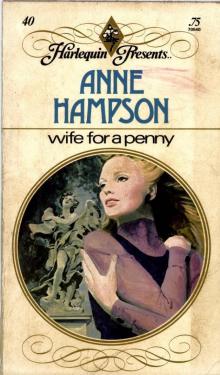 Wife for a Penny
Wife for a Penny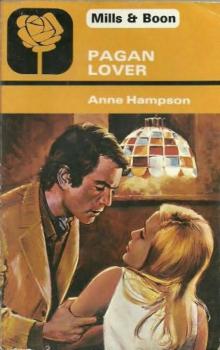 Pagan Lover
Pagan Lover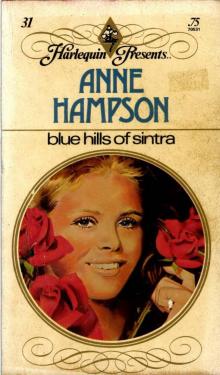 Blue Hills of Sintra
Blue Hills of Sintra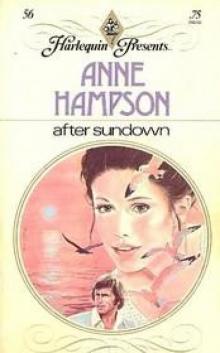 After Sundown
After Sundown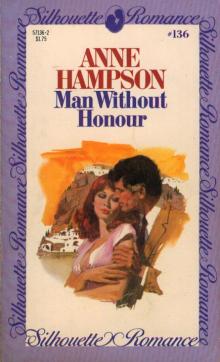 Man Without Honour
Man Without Honour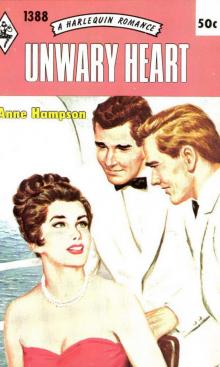 Unwary Heart
Unwary Heart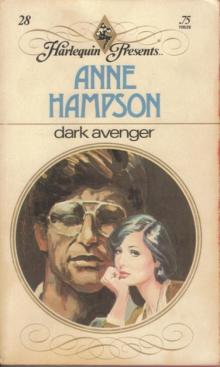 Dark Avenger
Dark Avenger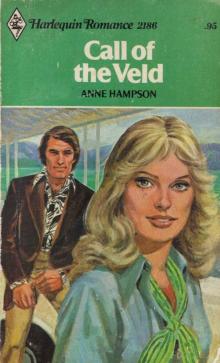 Anne Hampson - Call of The Veld
Anne Hampson - Call of The Veld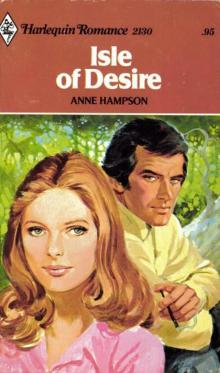 Isle of Desire
Isle of Desire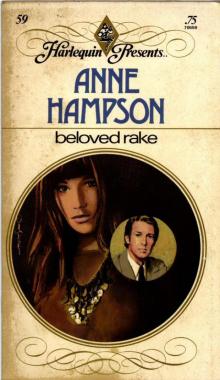 Beloved Rake
Beloved Rake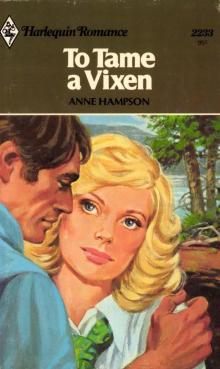 To Tame a Vixen
To Tame a Vixen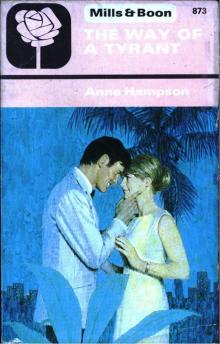 The Way of a Tyrant
The Way of a Tyrant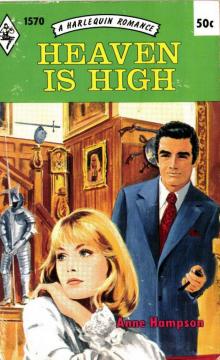 Heaven is High
Heaven is High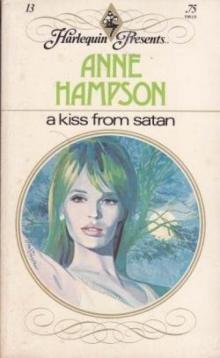 A Kiss From Satan
A Kiss From Satan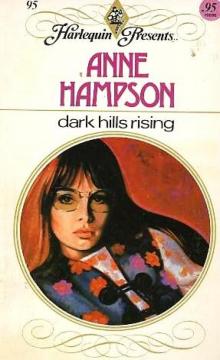 Dark Hills Rising
Dark Hills Rising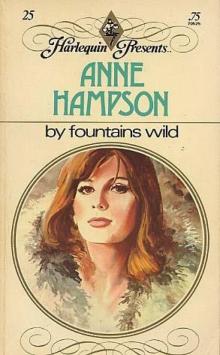 By Fountains Wild
By Fountains Wild Second Tomorrow
Second Tomorrow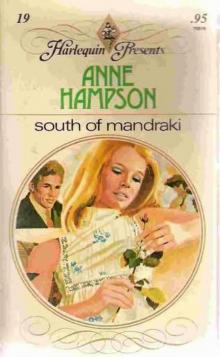 South of Mandraki
South of Mandraki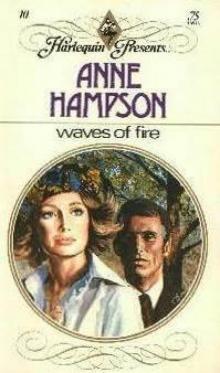 Waves of Fire
Waves of Fire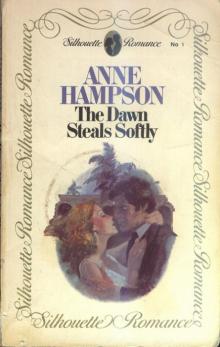 The Dawn Steals Softly
The Dawn Steals Softly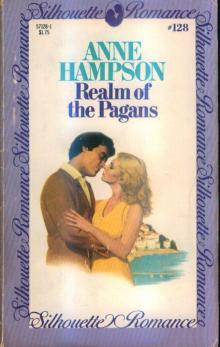 Realm of the Pagans
Realm of the Pagans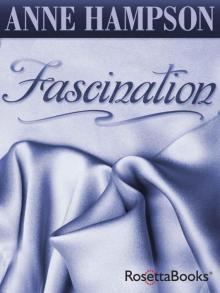 Fascination
Fascination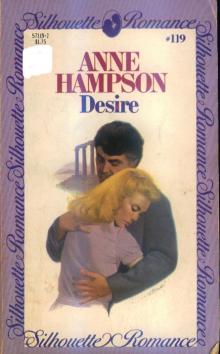 Desire
Desire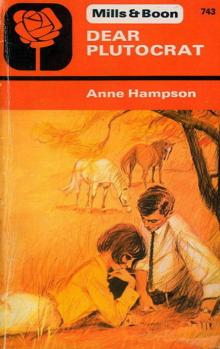 Dear Plutocrat
Dear Plutocrat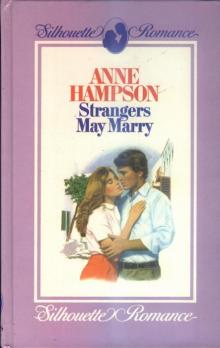 Strangers May Marry
Strangers May Marry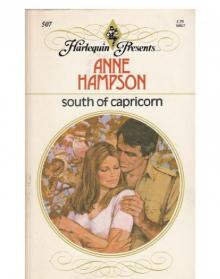 South of Capricorn
South of Capricorn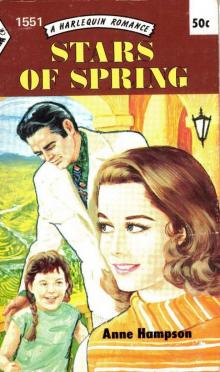 Stars of Spring
Stars of Spring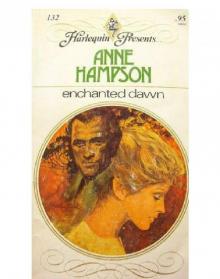 Enchanted Dawn
Enchanted Dawn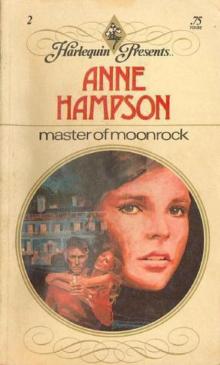 Master of Moonrock
Master of Moonrock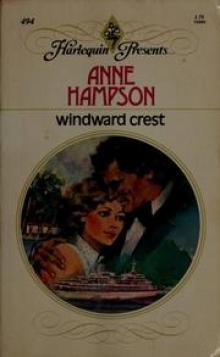 Windward Crest
Windward Crest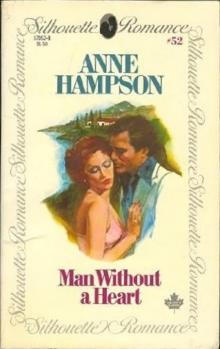 Man Without a Heart
Man Without a Heart